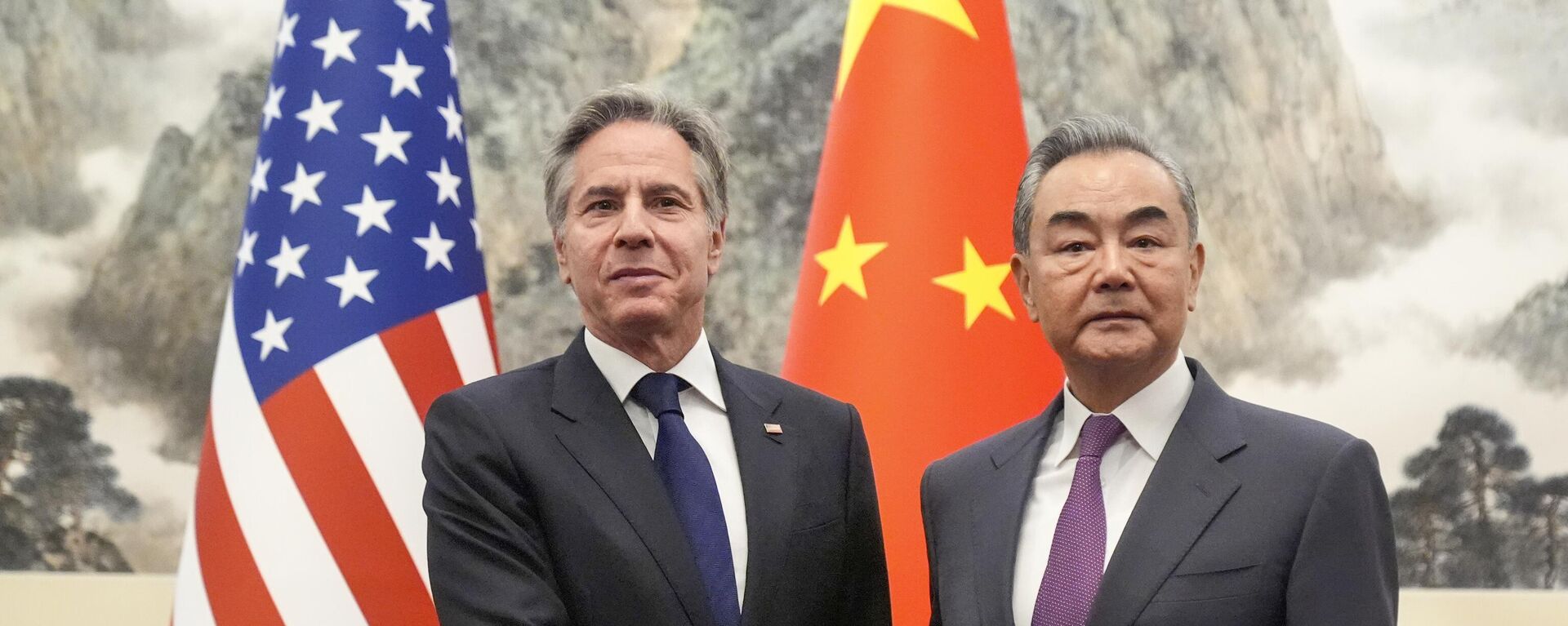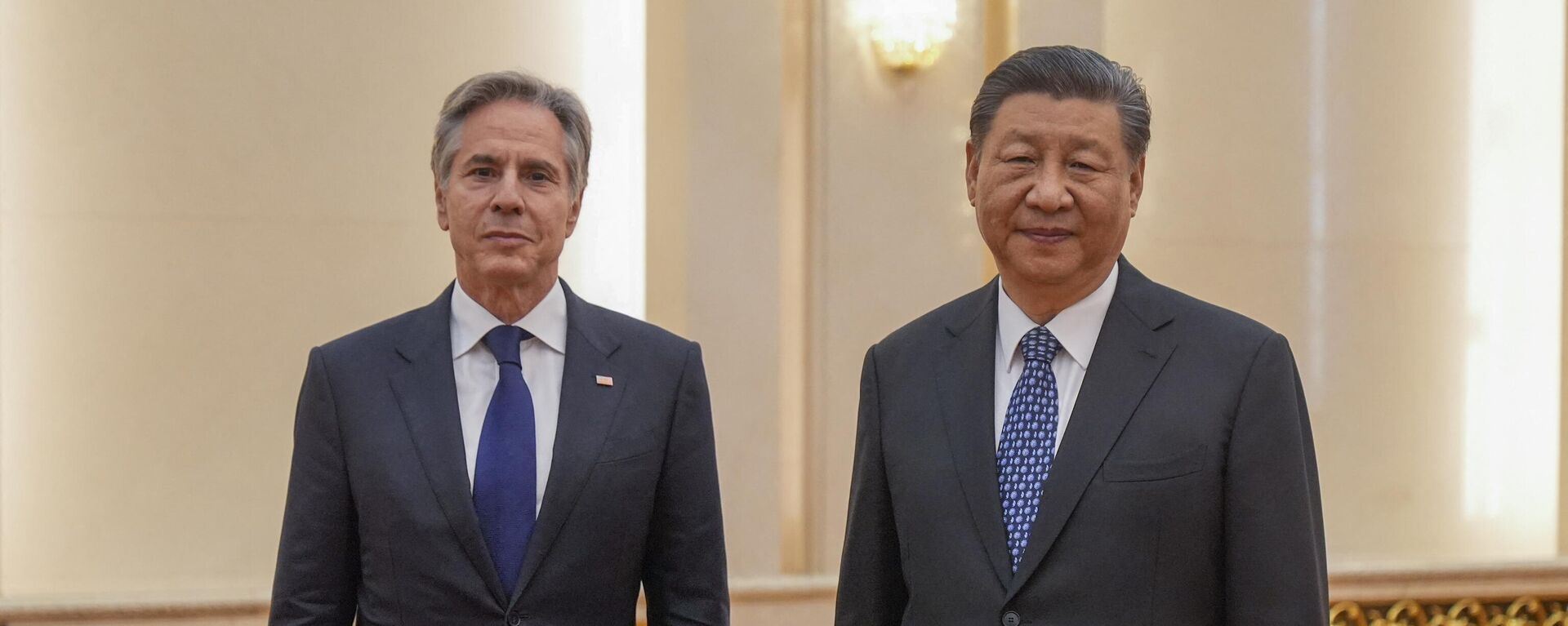https://en.sputniknews.africa/20240428/chinas-dominance-over-us-in-various-fields-exacerbates-mutual-tensions-expert-says-1066279365.html
China's Dominance Over US in Various Fields Exacerbates Mutual Tensions, Expert Says
China's Dominance Over US in Various Fields Exacerbates Mutual Tensions, Expert Says
Sputnik Africa
During a three-day visit to China, US Secretary of State Antony Blinken met with Chinese President Xi Jinping on Friday. At the meeting, China has clearly... 28.04.2024, Sputnik Africa
2024-04-28T18:11+0200
2024-04-28T18:11+0200
2024-04-28T19:06+0200
international
antony blinken
xi jinping
joe biden
china
united states (us)
beijing
economy
https://cdn1.img.sputniknews.africa/img/07e8/04/1c/1066279543_0:0:3072:1728_1920x0_80_0_0_f5e9e97428ea16ecbd97493eeb41879d.jpg
China has "the upper hand over America in many fields," raising tensions between the two countries, Francesco Sisci, a Beijing-based China expert, author, and columnist, told Sputnik.Beijing’s advantage over Washington lies in “possessing, so far, the only comprehensive production capacity in the world,” he noted.He added that time will show whether the US, “trying to restore some of its industrial capacity,” will be able to do so in a “capacity similar to that of China.”Amid a push to isolate Russia globally, a succession of US leaders have visited China recently. Irked by strong ties between Moscow and Beijing, first US Treasury Secretary Janet Yellen descended upon China to give a lecture on trade. Then Blinken headed to the Asian power amid rising pressure on the People's Republic of China.The Biden administration has been nursing a list of grievances against China, ranging from its continued trade with Russia as the Ukrainian crisis continues, to Beijing’s dominance in electric vehicle manufacturing and other areas.Visiting US officials alternated their rhetoric between seeking to further stabilize economic and trade relations with accusations of unfair trade practices and “overproduction.”Indeed, China has “overcapacity,” to use Yellen's words, "in many innovative fields, say, new energy, batteries, solar panels, some types of chips that are almost uniquely produced in China," Sisci noted. "Having these industrial capacities in other countries is possible, but will require time.”When Blinken met Chinese President Xi Jinping on Friday as part of his three-day visit to China, the US official regurgitated assertions of “unfair trade practices” by China and the possibility of the US and other markets being flooded with Chinese products.Xi responded that the two countries “should be partners rather than adversaries”, noting that the world is “big enough” to accommodate “the simultaneous development and prosperity of both China and the US.”The talks ended with little agreement on trade competition and economic rivalry.As the Biden administration tackles a raft of domestic challenges, ranging from a huge national debt to declining manufacturing growth, it has followed up on previous efforts by Washington over the years to crack down on China in critical technological fields, including microchips.Large tax breaks and subsidies have been offered to developers to build green energy manufacturing facilities in the US in order to break their dependence on Chinese supply chains. Via the so-called CHIPS Act the US hoped to gain an edge over China in microelectronics.However, China’s breakthroughs in the field are such that it is reportedly poised to close the gap with the US in terms of “microchips with artificial intelligence.”China has continuously refuted unfounded allegations of a “China threat” as part of “ill-intended attempts to contain" its development. Regarding the new "overcapacity" hype, Chinese Ambassador to the US Xie Feng recently pointed out that the problem is not "overcapacity," but "over-anxiety."
https://en.sputniknews.africa/20240426/1066245721.html
https://en.sputniknews.africa/20240428/1066273163.html
china
united states (us)
beijing
Sputnik Africa
feedback@sputniknews.com
+74956456601
MIA „Rossiya Segodnya“
2024
News
en_EN
Sputnik Africa
feedback@sputniknews.com
+74956456601
MIA „Rossiya Segodnya“
Sputnik Africa
feedback@sputniknews.com
+74956456601
MIA „Rossiya Segodnya“
international, antony blinken, xi jinping, joe biden, china, united states (us), beijing, economy
international, antony blinken, xi jinping, joe biden, china, united states (us), beijing, economy
China's Dominance Over US in Various Fields Exacerbates Mutual Tensions, Expert Says
18:11 28.04.2024 (Updated: 19:06 28.04.2024) During a three-day visit to China, US Secretary of State Antony Blinken met with Chinese President Xi Jinping on Friday. At the meeting, China has clearly stated to the US that it holds accountability for the tensions in their bilateral relations, expert from the Chinese University of International Business and Economics, Wang Zhimin said.
China has "
the upper hand over America in many fields," raising tensions between the two countries,
Francesco Sisci, a Beijing-based China expert, author, and columnist,
told Sputnik.Beijing’s advantage over Washington lies in “possessing, so far, the only comprehensive production capacity in the world,” he noted.
“China can produce anything without going to other countries," Sisci said. "No other country is as industrially self-sufficient, so to speak. So this is a major advantage in times of great competition.”
He added that time will show whether
the US, “
trying to restore some of its industrial capacity,” will be able to do so in a “
capacity similar to that of China.”
Amid a push to isolate Russia globally, a succession of US leaders have visited China recently. Irked by strong ties between Moscow and Beijing, first US Treasury Secretary Janet Yellen descended upon China to give a lecture on trade. Then Blinken headed to the Asian power amid rising pressure on the People's Republic of China.
The Biden administration has been nursing a list of grievances against China, ranging from its continued trade with Russia as the Ukrainian crisis continues, to Beijing’s dominance in electric vehicle manufacturing and other areas.
Visiting US officials alternated their rhetoric between seeking to further stabilize economic and trade relations with accusations of unfair trade practices and “overproduction.”
Indeed, China has “
overcapacity,” to use Yellen's words, "
in many innovative fields, say, new energy, batteries, solar panels, some types of chips that are almost uniquely produced in China," Sisci noted.
"Having these industrial capacities in other countries is possible, but will require time.”
When Blinken met Chinese President Xi Jinping on Friday as part of his three-day visit to China, the US official regurgitated assertions of “unfair trade practices” by China and the possibility of the US and other markets being flooded with Chinese products.
Xi responded that the two countries “should be partners rather than adversaries”, noting that the world is “big enough” to accommodate “the simultaneous development and prosperity of both China and the US.”
The talks ended with little agreement on trade competition and economic rivalry.
As the
Biden administration tackles a raft of domestic challenges, ranging from a huge national debt to declining manufacturing growth, it has followed up on previous efforts by Washington over the years to crack down on China in critical technological fields, including microchips.
Large tax breaks and subsidies have been offered to developers to build green energy manufacturing facilities in the US in order to break their dependence on Chinese supply chains. Via the so-called CHIPS Act the US hoped to gain an edge over China in microelectronics.
However, China’s breakthroughs in the field are such that it is reportedly poised to close the gap with the US in terms of “microchips with
artificial intelligence.”
“I do believe that what the Americans want with this CHIPS act is not so much creating a situation in the present as trying to deny access to Chinese companies from future American technology," Sisci remarked. "American technology is about to develop a new chip that should power its artificial intelligence. This could be an industrial revolution and America wants to deny access to China from this technology… However, it's not clear whether it will work or not.”
China has continuously refuted unfounded allegations of a “
China threat” as part of “
ill-intended attempts to contain" its development. Regarding the new "overcapacity" hype, Chinese Ambassador to the US Xie Feng recently pointed out that the problem is not "overcapacity," but "over-anxiety."



